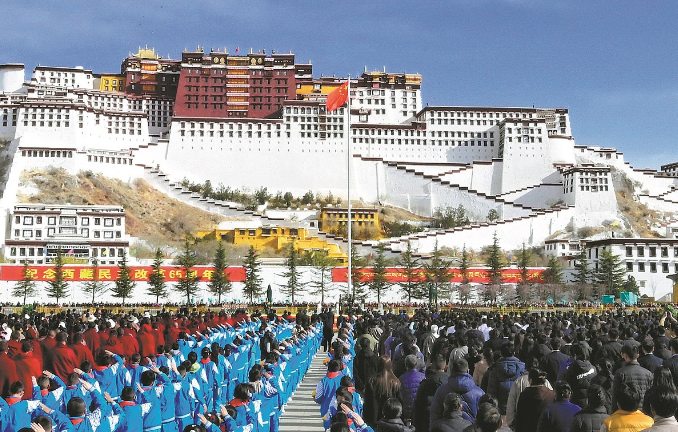Forum extols benefits of Xizang's democratic reform
Updated: 2024-03-29 (China Daily)  Print
Print 



People attend a flag-raising ceremony at Potala Palace Square in Lhasa, Xizang autonomous region, to mark Serfs' Emancipation Day on Thursday. TENTSEN SHINDEN/FOR CHINA DAILY
Any attempt to romanticize pre-liberation Xizang, with its oppressive feudal serfdom, as a Shangri-La blatantly disregards the plight of its suffering serfs and deliberately tramples on the notion of human rights, experts said at a forum in Beijing on Thursday.
To celebrate the 65th anniversary of Xizang's democratic reform in 1959, which liberated over 1 million people from serfdom and slavery, a forum was jointly held by the China Tibetology Research Center, the China Association for Preservation and Development of Tibetan Culture, and the China Society for Human Rights Studies.
Before democratic reform, 95 percent of Xizang's population were serfs and slaves. They had no freedom or rights and were considered the private property of their masters, often being referred to as "talking livestock".
While serfdom was abolished in various countries worldwide, paving the way for the development of capitalism and modern societies, Xizang remained closed off under a feudal serfdom system for thousands of years, which severely hampered its modernization and development, said Yan Yongshan, a researcher at China Tibetology Research Center.
The democratic reform led by the Communist Party of China overturned the dark and backward system of feudal serfdom, where politics and religion were intertwined, liberating the majority of the population and granting them equal rights, said Gelek, another researcher at the center.
He said transitioning directly from serfdom to a communist system avoided much bloodshed and turmoil that might have otherwise occurred.
After the democratic reform, Xizang achieved rapid development in various aspects, including people's rights, economic growth, education, religion, culture and ecological conservation.
Chen Zongrong, the center's Party secretary, said that despite the significant achievements made in Xizang, the Dalai Lama, driven by personal interests, distorts facts to excessively glorify the old system in Xizang and stigmatizes its democratic reform, misleading many ordinary people in the West.
Jin Canrong, a professor of international relations at Renmin University of China, said Westerners often harbor biases against Xizang. He mentioned encountering some left-wing Germans who drive BMWs but want the Tibetan people to forever live a primitive, pre-modern lifestyle, believing it to be picturesque.
"This is undoubtedly a form of racism, denying the Tibetan people's right to pursue happiness and modernization," he said.
Chen said commemorating Xizang's democratic reform is important.
"As long as anti-China forces abroad and the separatist group led by the Dalai Lama persist, commemorating this anniversary remains meaningful," he said.








